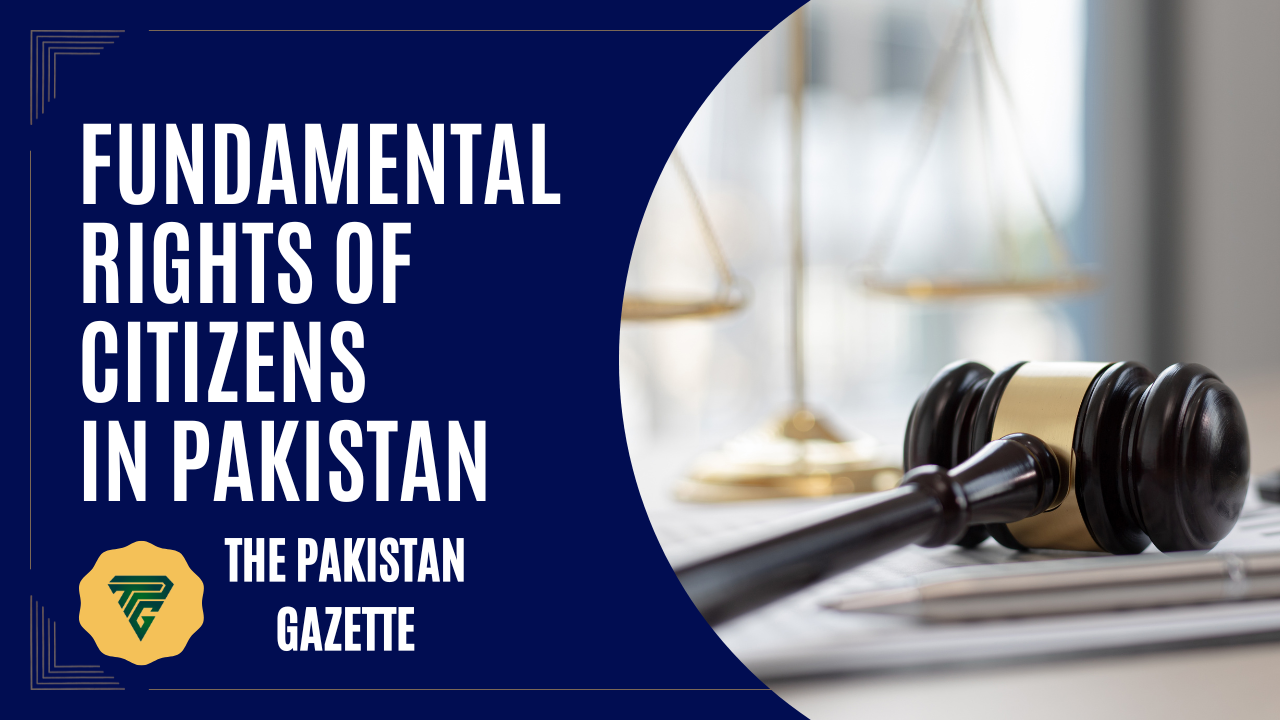
Fundamental Rights of citizens in Pakistan
Fundamental rights are the basic rights and freedoms that are guaranteed to all individuals in a society, typically by a constitution or other fundamental legal document. These rights are considered fundamental because they are essential to the protection of human dignity, personal autonomy, and individual freedom.
Examples of fundamental rights include freedom of speech, freedom of religion, the right to privacy, the right to a fair trial, the right to education, and the right to equal treatment under the law. In many countries, fundamental rights are also protected by laws that prohibit discrimination based on factors such as race, gender, religion, and sexual orientation.

The recognition and protection of fundamental rights are essential for a just and democratic society, as they ensure that individuals are free to express themselves, pursue their own interests and beliefs, and live their lives without fear of persecution or discrimination.
While speaking of Fundamental Rights in Pakistan, the Constitution of Pakistan guarantees to ensure that citizens can live their lives with dignity, respect, and freedom.
Provisions of Fundamental Rights
Here is a detailed note on fundamental rights in Pakistan along with relevant provisions:
1. Right to Life: Article 9 of the Constitution guarantees the right to life to every citizen of Pakistan. This means that no one can be deprived of their life or liberty except in accordance with the law.
2. Right to Dignity: Article 14 of the Constitution guarantees the right to dignity to every citizen of Pakistan. This means that every person has the right to be treated with respect and dignity, and their privacy and home shall be inviolable subject to the law.
3. Right to Freedom: Article 19 of the Constitution guarantees the right to freedom of speech, expression, thought, and association to every citizen of Pakistan. This means that every person has the right to express their views freely, and the press shall have freedom, subject to reasonable restrictions imposed by law in the interest of the glory of Islam or the integrity, security, or defence of Pakistan.
4. Right to Equality: Article 25 of the Constitution guarantees the right to equality to every citizen of Pakistan. This means that every person shall be treated equally before the law, and they are entitled to equal protection of the law without discrimination on the basis of religion, race, caste, gender, or place of birth.
5. Right to Fair Trial: Article 10 of the Constitution guarantees the right to a fair trial to every citizen of Pakistan. This means that no person shall be deprived of their life or liberty except in accordance with the law, and they shall have the right to be heard and to defend themselves.
6. Right to Privacy: Article 14 of the Constitution guarantees the right to privacy to every citizen of Pakistan. This means that every person has the right to be secure in their home, subject to law.
7. Right to Education: Article 25-A of the Constitution guarantees the right to education to every citizen of Pakistan. This means that the State shall provide free and compulsory education to all children of the age of five to sixteen years in such a manner as may be determined by law.
8. Right to Religious Freedom: Article 20 of the Constitution guarantees the right to religious freedom to every citizen of Pakistan. This means that every person has the right to profess, practice, and propagate their religion subject to law, public order, and morality.
9. Right to Property: Article 23 of the Constitution guarantees the right to property to every citizen of Pakistan. This means that every person has the right to acquire, hold, and dispose of property in any part of Pakistan subject to the Constitution and any reasonable restrictions imposed by law in the public interest.
10. Right to Information: Article 19-A of the Constitution guarantees the right to information to every citizen of Pakistan. This means that every person has the right to have access to information in all matters of public importance subject to regulation and reasonable restrictions imposed by law.
Conclusively, these fundamental rights ensure that every citizen of Pakistan is treated with dignity, respect, and equality before the law. The government is responsible for upholding and protecting these rights, and citizens have the right to approach the courts if their rights are violated.
Ihsan Ullah has done LLB (Law and Shariah) from Islamia College University Peshawar. He is a practising lawyer in Peshawar. He writes content related to law at The Pakistan Gazette and on his Instagram Page Know The Law.


One reply on “Fundamental Rights of citizens in Pakistan”
[…] Fundamental Rights of citizens in Pakistan […]